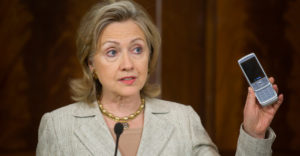by WorldTribune Staff, August 30, 2016
Hillary Clinton said Edward Snowden should be “facing the music” for revealing NSA secrets, but her campaign has no problem with using a “Snowden-approved” encrypted messaging app, a report said.
An individual close to the DNC and the Clinton campaign said that, following the release of hacked DNC emails, staffers were told to use “Signal” when privately discussing Donald Trump, according to a recent report by Vanity Fair.

“In the intervening weeks, staffers were told, according to a person who works with the committee, that if anyone was going to communicate about Donald Trump over email or text message, especially if those missives were even remotely contentious or disparaging, it was imperative that they do so using an application called Signal,” Vanity Fair’s Nick Bilton writes.
Signal, an app for Android and iPhone, is considered by leading security experts, including Snowden, to be the “gold standard for end-to-end encrypted communications.”
“Signal, staffers in the meeting were told, was ‘Snowden-approved,’” Bilton wrote. “A week after the meeting at the campaign headquarters, according to two people who have worked with the DNC and the Clinton campaign, an e-mail was sent out instructing staffers where to download the app and how to use it.”
During a Democratic debate in October 2015, Clinton insisted that Snowden should be “facing the music” for revealing NSA secrets.
“He broke the laws of the United States. He could have been a whistleblower,” Clinton said. “He could have gotten all of the protections of being a whistleblower. He could have raised all the issues that he has raised. And I think there would have been a positive response to that.”
Some observers, though, say Snowden, who did raise concerns internally over domestic surveillance, would have been ineligible for whistleblower protections because he was a contractor for Booze Allen Hamilton, not an official NSA employee.
The Daily Dot’s Patrick Howell O’Neill noted that Clinton’s current stance on encryption has been vague at best.
“It’s impossible to know where she stands,” O’Neill writes. “Today she backs a congressional ‘encryption commission’ to examine the question (even though virtually every technologist has already offered an answer).”
“In 2015, Clinton was for a ‘Manhattan-like project’ to break encryption. Further back, in 2011, she was the world’s most vocal and powerful proponent for funding encryption technology development.”
